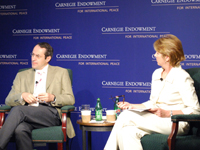Registration
You will receive an email confirming your registration.
Even with the troop surge in Afghanistan, the coalition’s control continues to fall as the Taliban gain strength—this is the deadliest year for NATO troops since 2001. The Obama administration plans a strategic review of the war in December against the backdrop of rising costs both in lives and money and increasing unease with the Karzai government.
Gilles Dorronsoro, who was in Afghanistan this summer, talked about the conditions on the ground with the New York Times’ Elisabeth Bumiller, just back from the country this week. They discussed the direction of U.S. strategy and Dorronsoro explained why negotiating with the Taliban is the best hope for long-term stability and an eventual withdrawal.
Why is the Situation Deteriorating?
Dorronsoro observed that the security situation had deteriorated markedly since his last visit in April 2010, on roads leading out of Kabul and in the North.
- Anticipating a Taliban Victory: There has been a broad Taliban resurgence in the north, which the coalition had believed to be stable since it does not have a majority Pashtun population. However, Dorronsoro pointed out that there are pockets of Pashtun in the region which can provide a constituency for the Taliban. Furthermore, an increasing number of non-Pashtun Afghans have begun joining the Taliban, either for ideological reasons or because they anticipate an eventual coalition defeat and are working to ingratiate themselves with the Taliban.
- European Reticence: European coalition forces have tended to focus on protecting themselves or their convoys rather than attempting to engage Taliban ambushes or pursue enemy forces, Dorronsoro noted. Even if they stay in Afghanistan, European troops are less and less relevant.
- Strategic Mistake: The U.S. command’s decision to concentrate forces in the south was a significant error, Dorronsoro asserted. In the near term, there is no realistic chance of significant improvement in the south, and the movement of troops out of the north leaves the rest of the country vulnerable to the Taliban. Had the United States maintained or increased its forces in the north and focused on securing urban centers, notably Kabul, a real opportunity for progress could have existed.
- Corruption: Corruption one of the reasons the Afghan people are losing faith in their government, Dorronsoro stated. But, the real question now is the shrinking footprint of the Afghan government outside Kabul and the fledgling Afghan state is disintegrating.
What is the Solution?
Given the deteriorating security situation and lack of viable alternatives, the United States has no real choice but to begin negotiations with the Taliban, Dorronsoro stated.
- Why the Taliban Will Negotiate: Although the Taliban are in an advantageous position, they will still come to the negotiating table for two reasons:
- Survival: The coalition has been able to inflict casualties on the Taliban, especially in their middle ranks. Some Taliban members may feel the need to negotiate for their own personal security, although this is unlikely to motivate a large number of Taliban leaders.
- Pakistan: The Pakistani military is effectively in control of the Taliban’s leadership, Dorronsoro said. Pakistan will pressure the Taliban to negotiate because it is in Pakistan’s interest to have international negotiations and a pro-Pakistani government in Kabul.
- What a Post-Negotiation Afghanistan Could Look Like: In the best case, the chief result of negotiations would be the formation of a coalition government, Dorronsoro said. The Taliban would return to Afghanistan and would no longer need to depend on the Pakistani military for survival. Any negotiated settlement would require a guarantee that al-Qaeda and other terrorist organizations would not be able to use Afghanistan as a safe haven.
- The Best of Bad Options: Although negotiating with the Taliban is not an appealing concept, Dorronsoro argued that it is near impossible to defeat them when Pakistan continues to provide them with sanctuary. The United States must act now to reach a reasonable settlement that would leave the West secure.
